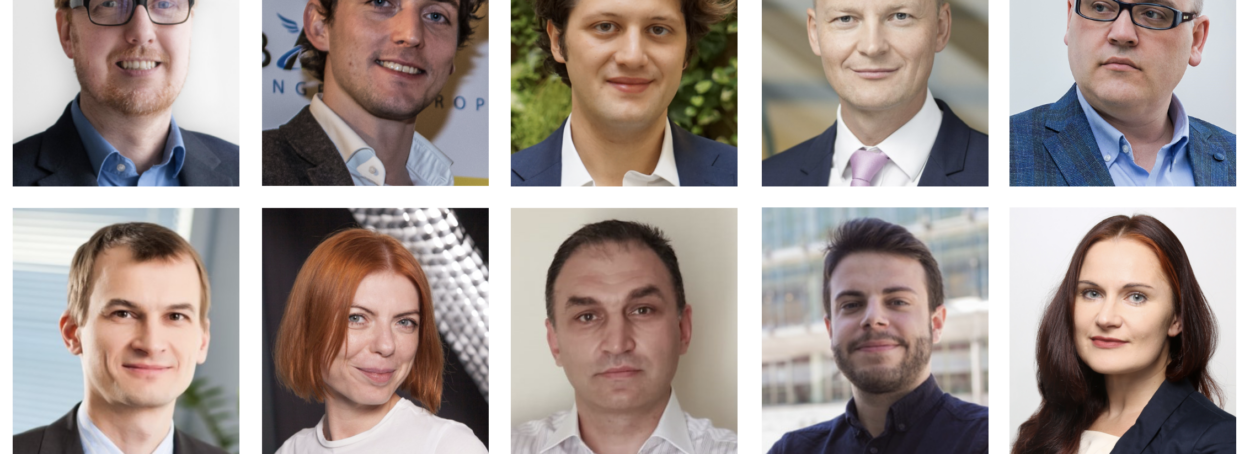

An EU4Digital networking event on 8 October discussed ways to integrate alternative finance providers from Eastern partner countries into European networks and platforms, and how to build up their capacity to increase digital SMEs’ access to finance in the region.
The virtual networking event, held as part of the EU4Digital Steering Committee week, was aimed at alternative finance sector organisations from Eastern partner countries, to support partnerships between business networks and associations in the region and their European counterparts. During the meeting, key EU business support, business angel (BA) and crowdfunding networks presented value propositions, plans and visions for possible cooperation in the EaP region, namely:
- European Business & Innovation Centre Network (EBN)
- European Business Angels Network (EBAN)
- Business Angels Europe (BAE)
- European Crowdfunding Network (ECN)
The event attracted more than 80 participants from around 55 various EaP organisations from the alternative finance sector. Representatives of business angels, venture capital associations, crowdfunding platforms, ministries, agencies, and other ecosystem actors from Easter partner countries as well as Harmonised Digital Market (HDM) Coordinators, EU Delegations and members of the ICT innovation Expert network joined the discussion.
The event was made up of different interactive sessions focusing on several aspects of access to finance:
- Networking of innovation & business support ecosystems
- Networking of Business Angels and Venture Capital associations
- Networking of crowdfunding ecosystems
The event was opened by EU4Digital ICT Innovation stream leader and moderator of the event, Anna Pobol, introducing the aims of the networking event, followed by a keynote speech on ‘Angel investment in the EaP region’ by Jesus Lozano, ICT Strategic Adviser at the European Innovation Council.
Mr. Lozano emphasised the critical importance of networking with other local and international ICT Innovation ecosystem actors and building links with the ecosystem, to help early stage investors to select promising start-ups, increase their success rate and leverage risks. Benefits of BA networks compared to stand-alone investments include sharing resources, pooling funds, matching, fellowship and bigger influence in or easier access to the market, said Mr. Lozano.
The session on ‘Networking of innovation & business support ecosystems’ was led by EBN representatives David Uhlíř and Luca Maini. Their presentation on ‘The European community of business innovation leaders and vision of possible cooperation in the EaP region’ highlighted the EBN’s key initiatives – EU Business Innovation Centres (EU|BIC) certification, development and distribution of quality business support programmes, initiation and facilitation of project collaborations, global networking, and advocacy for business support. In support of its mission to use innovation as a force for regional development through innovative SMEs, the EBN’s benchmarking of quality certified organisations through the EU|BIC Quality Mark enables members to uphold high-quality standards of innovation support. A practical example of ‘Establishing EBN Business and Innovation Centres in Ukraine’ was shared by Inna Petrenko, adviser at Ukraine’s SME Development Office (SMEDO), who related the opportunities and challenges, as well as the progress in establishing such an organisation in Ukraine. The Ukrainian experience demonstrates that in order to be sustainable, BICs need to provide high quality services following a market-driven approach, with capacity building essential to ensure a high quality of service, as well as expanding with several business support organisations across the country. Ukraine is currently considering the establishment of a wide national network of 24 EU|BICs within the Government Priority Action Plan of Economic Recovery 2020-2022.
The discussion continued with a session on Networking of Business Angels and Venture Capital associations. The main questions focused on capacity building of BAs and BA network managers, and networking with communities of EU organisations. Answers were provided by Jacopo Losso, Director of Secretariat at EBAN, who shared his knowledge about ‘Understanding the business angel landscape in Europe and connecting with it’. Mr. Losso introduced EBAN as the pan-European representative for the early-stage investor community, gathering over 150 member organisations in more than 50 countries, and representing a sector estimated to invest €11.4 billion a year. Participants raised questions on possible government support in developing BA ecosystems in their countries. In the ensuing discussion, tax incentives and co-investment schemes were mentioned as possible ways for governments to support local angel communities. However, Mr. Losso advised that the creation of national programmes in support of BAs and the choice of support instruments should be carried out in close collaboration with the local BAs community and international communities experienced in comparing the effects of applying various tools across different countries.
The opportunities and experience of ‘Working with the leading angel networks in Europe’ were presented by Jan Debets, Head of Operations at BAE. The main activities of the organisation are intensive networking through specialised events, research and data collection and sharing with community members. Mr. Debets introduced the Women Angels 4 Europe’s Entrepreneurs study, which fosters discussion on the potential promotion of women’s entrepreneurship in the EaP countries. Additionally, the EuroQuity platform for accessing investors and ecosystem players was presented as a useful tool for connecting with the network in the EU.
The final session was dedicated to ‘Networking of crowdfunding ecosystems’, with a presentation on ‘Value proposition and vision of possible cooperation in the EaP region’ by Oliver Gajda, Executive Director at ECN. The aim of the network is to help to develop professional standards, provide industry research, and professional networking opportunities between members and key industry participants. During the discussion, the participants stated that loan-based and equity-based forms of crowdfunding were of special interest for EaP countries. Mr. Gajda noted the possibilities to support Eastern partner countries with the development of a crowdfunding regulatory framework according to EU best practice.
A practical perspective on Crowdfunding was presented by Otar Gorgodze, Head of Financial and Supervisory Technology Development Department at the National Bank of Georgia, who shared the ‘Challenges and process in developing regulations for crowdfunding in Georgia’. He said that a technology-neutral approach in supervision had recently been adopted by the bank. New structures were created to help the development of the financial ecosystem in Georgia since December 2019, including the Financial Innovation Office, RegLab, AI&ML model risk governance framework, Digital Bank Licensing framework and Open API standard. The discussion afterwards addressed the peculiarities of these instruments and the requests from the other EaP countries to share the experiences in regulating financial markets.
The networking event wrapped up with the conclusion that there is a need for further collaboration of Eastern partner countries with EU networks and platforms. Follow-up meetings between each EU organisation and interested participants from Eastern partner countries are planned to be held to continue discussions regarding the practical connection of the organisations, including the establishment of capacity building programmes and possible membership in EU organisations.
ICT Innovation Networking events
ICT Innovation networking events aim to facilitate the establishment of EaP communities in the selected ICT Innovation policy areas. In addition to creating networks in the region, they strive for the establishment of bilateral and multilateral bridges between the Eastern partner organisations and EU stakeholders to enable further sustainable joint activities and projects. These efforts aim for overall deeper knowledge and understanding of relevant EU best practices by stakeholders in the region. Therefore, the series of events targets a wide audience, including ministerial level representatives and agencies, associations and networks of relevant policy areas, ICT Infrastructure organisations as well as other ICT Innovation ecosystem actors.
Presentations
- Armenia
- Azerbaijan
- Belarus
- Georgia
- Republic of Moldova
- Ukraine
- ICT innovation
More News

16/04/2024
ICT investment opportunities highlighted in EU-Moldova investment event
EU4Digital Facility supported the European Commission in organising a Digital and ICT sector session during th…
Read More
12/04/2024
Armenian and Belgian officials meet to discuss cooperation in high-tech and IT sectors
Minister Mkhitar Hayrapetyan of Armenia’s Ministry of High-Tech Industry met with Eric De Muynck, the Ambassad…
Read More
11/04/2024
EU best practice report on 5G private networks development available for download
EU4Digital Facility experts have prepared the EU best practice report on the development of 5G private network…
Read More

16/04/2024
ICT investment opportunities highlighted in EU-Moldova investment event
EU4Digital Facility supported the European Commission in organising a Digital and ICT sector session during th…
Read More
12/04/2024
Armenian and Belgian officials meet to discuss cooperation in high-tech and IT sectors
Minister Mkhitar Hayrapetyan of Armenia’s Ministry of High-Tech Industry met with Eric De Muynck, the Ambassad…
Read More
11/04/2024
EU best practice report on 5G private networks development available for download
EU4Digital Facility experts have prepared the EU best practice report on the development of 5G private network…
Read More


